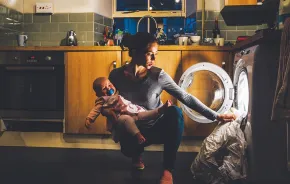Evergreen State College professor and author Stephanie Coontz has made a career of debunking our cultural myths about women and family life. In her Mother's Day piece in the New York Times, she tackles the widely-believed story about the devaluation of stay-at-home motherhood.
One of the most enduring myths about feminism is that 50 years ago women who stayed home full time with their children enjoyed higher social status and more satisfying lives than they do today. All this changed, the story goes, when Betty Friedan published her 1963 best seller, “The Feminine Mystique,” which denigrated stay-at-home mothers. Ever since, their standing in society has steadily diminished.
Not so, she says. The time when stay-at-home mothers were most secure in their social standing was in the 19th century, when women were seen as occupying a uniquely noble position, sequestered from the brutality of the male business world. That began to change early last century, when motherhood began to be seen as a "sissifying" influence on the country's men -- an idea promulgated by male writers and psychiatrists.
Typical of the invective against homemakers in the 1950s and 1960s was a 1957 best seller, “The Crack in the Picture Window,” which described suburban America as a “matriarchal society,” with the average husband “a woman-bossed, inadequate, money-terrified neuter” and the average wife a “nagging slob.” Anti-mom rhetoric was so pervasive that even Friedan recycled some of this ideology in “The Feminine Mystique” — including the repellent and now-discredited notion that overly devoted mothers turned their sons into homosexuals.
The widespread denigration of what was then seen as a woman's primary job led to "widespread feelings of inadequacy and depression among stay-at-home mothers." Today, Coontz says
There also seems to have been a significant shift in the relationship between depression and homemaking. Stay-at-home mothers still recount more feelings of loneliness than working mothers. But in a new Council on Contemporary Families briefing paper, the sociologists Margaret Usdansky and Rachel A. Gordon report that among mothers of young children, those who were not working and preferred not to have a job had a relatively low risk of depression — about as low as mothers who chose to work and were able to attain high-quality jobs.









